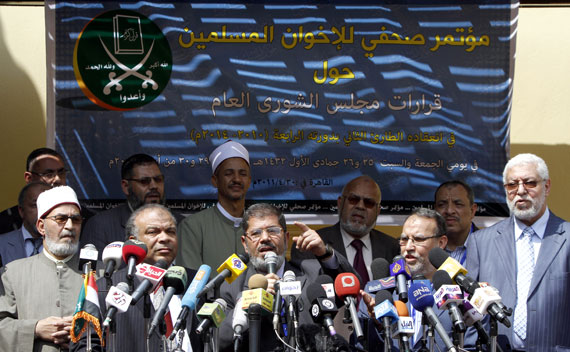Egyptian Elections: Some Perspective, Please
More on:

If you extrapolate the preliminary results to the final tally—which you can because the first round took place in major population centers like Cairo and Alexandria as well as smaller cities such as Luxor, Assiut, and Damietta —the Islamists have scored an impressive victory. Preliminary results indicate that the Muslim Brotherhood’s Freedom and Justice Party garnered 36.6 percent of the vote. I am not sure anyone should be totally surprised by this, which is almost exactly the tally the Brothers indicated was their goal. Perhaps some observers believed that because prominent Brothers like Abdel Monem Aboul Fotuh defied the organization’s leadership and has set out on his own candidacy for president or that a group of younger members broke from the Brotherhood to form the Egyptian Current party that the movement was in “crisis.” Yet even if the Brotherhood was having problems adjusting to Egypt’s new political environment, the Brothers remained the most well-organized and well-resourced group in the political arena. In addition, they had the advantage of an 80-year head start, a history of providing critical services (with the government’s approval) to Egyptians that became a powerful mechanism for political mobilization, and political agenda couched in a religious vernacular that resonates with large numbers of Egyptians. Of course, the Muslim Brothers were going to do well.
The Salafist al Nour Party’s results are more surprising only because the polls—as imperfect as they were—suggested that Salafist groups writ large didn’t poll more than single digits. The results indicate that al Nour will take 24.4 percent of the seats in the new People’s Assembly, raising concerns about an Islamist bloc in the parliament that will have unrivalled influence on the trajectory of Egyptian politics. This is, indeed, a concern, but it lacks nuance and context. Salafism has long been a feature of Egyptian society going back to the heyday of Islamic reformism in the late 19th and early 20th centuries. It became more pronounced during that tail end of the Mubarak era for a variety of reasons, but in particular because of the manipulations of the Interior Ministry, which sought to build up Salafi preachers in order to drain support away from the Muslim Brotherhood. This was done based on the belief that 1) the regime would always be there and could control the Salafists and, 2) Salafists would be politically quiescent, focused as they were on living in accordance to a strict interpretation of the Qur’an and Sunna. Those assumptions proved to be incorrect, but it does suggest that the Muslim Brotherhood’s Freedom and Justice Party and the al Nour Party may very well be competitors rather than partners in the People’s Assembly. Indeed, the Brother’s relative liberalism (in comparison to al Nour) diverges considerably from the Salafist worldview.
Once more, it is not out of the question for the Brothers to find common cause with parties of the Egyptian Bloc—which has 13.4 percent of the vote—if only to check the Salafists or the Supreme Council of the Armed Forces or because some as of yet unforeseen issue temporarily unites them. True neither the Brothers nor the Egyptian Bloc seem terribly enthusiastic about this in the abstract, but the old cliché that “politics makes strange bedfellows” doesn’t only apply to the United States and the West. There is also historical precedent for cooperation between the Brothers and non-religious parties. In 1984, for example, the Brothers entered into an alliance with the Wafd party. Now that was a very different era and the Wafd is not as liberal as people make it out to be, but it demonstrates that the Brothers have a history of pragmatism and flexibility. More recently, the Muslim Brotherhood contingent in the 2005-2010 People’s Assembly was made up of generally responsible parliamentarians who sought to shed light on the corruption and duplicity of the Mubarak era.
The Brothers may be disingenuous, of course. In the past, I have asked whether the Brotherhood has appropriated the language of reform and political change for inherently anti-democratic goals. That remains a serious concern. After all, the organization has never actually repudiated its historic goal of Islamizing Egyptian society, which has profound implications for women, minorities, liberals, and others, who have a different worldview. All that said, the way the Brothers will behave with a large number of parliamentary seats is an empirical issue. It has never happened before so we’ll just have to wait and see before drawing any conclusions.
More on:
 Online Store
Online Store